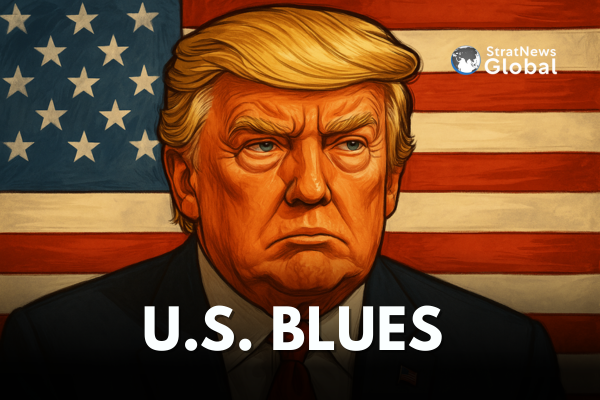Donald Trump’s posts condemning Jair Bolsonaro’s arrest followed by a 50% Tariff slap on Brazil as a retaliation are symptomatic of a larger phenomenon. Since 2016, Trump, as the leader of the anti-establishment MAGA movement, has sought to build an image as a pioneer, protector, and promoter of a global right-wing populist resurgence. This pursuit of legacy-building risks not only undermining the MAGA movement but also the strategic interests of the United States.
The global resurgent-right can be characterized by some common factors, such as strong-man leadership, economic protectionism or broader opposition to globalisation, a form of cultural nationalism, and a pro-business posture. In addition, they contain a strong strand of anti-immigrant politics. These factors have facilitated the rise of right-wing populist leaders around the world, including Trump, Bolsonaro, Boris Johnson, Viktor Orban, and Recep Tayyip Erdogan during the mid-2010s.
Trump as the Symbol of Global Populism
Trump’s 2016 election was emblematic of this phenomenon. Given the US’ stature as the “leader of the free world”, Trump’s success validated the movement globally. His popularity and colorful personality brought right-wing populism into the mainstream, marking the beginning of a more coordinated global alignment. He was one of the first leaders to openly endorse fellow populists abroad, often without regard to formal diplomatic relationships. The MAGA social-media ecosystem also began broadcasting opinions on international politics, boosting candidates and parties sympathetic to their values. The global reach of US-media platforms further reinforced Trump’s image as the de-facto leader of the movement.
Trump’s resounding victory in the 2024 US elections has bolstered this trend with Trump and prominent MAGA comrades—such as Elon Musk—begining endorsing right-wing populist candidates abroad. Slogans like “Make Europe Great Again” (MEGA) gained traction in parts of Europe. In Canada, at least initially, MAGA-aligned endorsements gave conservative candidates a perceived edge.
However, these endorsements soon proved to be double-edged swords. Trump’s foreign policy rehtoric and use of tariffs ignited anti-Trump sentiment within nationalist, right-wing voter bases in countries like Canada. In parts of Europe, including Germany and Romania, pro-Trump candidates faced voter backlash with a higher turnout of progressive and centrist voter blocs, leading to unexpected electoral defeats. Rather than serving as a boost, Trump became a polarizing force, galvanizing opposition and introducing external baggage into local elections.
Despite these setbacks, Trump and the MAGA movement remain steadfast in positioning themselves as the ideological heart of the global right. Trump continues to enjoy close relationships with prominent populists of the UK, France, Germany, Italy, Hungary, and Poland.
Ambition vs National Interest
Since the 1990s, U.S. national interest and grand strategy have largely centered on preserving its post–Cold War hegemony, with China and Russia emerging as its principal challengers since the 2010s. President George H. W. Bush’s vision of a “New World Order” relied on the promotion of international institutions, free trade, and liberal democratic norms—such as elections, rule of law, and free speech—as the foundational tools of global American hegemony.
Successive presidents from both parties—Clinton, Bush Jr., Obama, and even Biden—have upheld this vision in varying degrees, reinforcing partner states, institutions and norms that support U.S. primacy. Donald Trump, however, marked a departure from this consensus. His administration expressed open skepticism toward partners, international institutions, embraced economic nationalism, and endorsed leaders who shared anti-globalist and anti-institutional stances.
Parallel to this shift, many right-wing movements across U.S. allies and partners began to reject supranational structures—framing them as threats to national identity and economic sovereignty. This was most evident in the United Kingdom’s Brexit vote and the growing calls within Germany and France to reduce or even exit European Union integration.
It is owing to this nature of the movement that Trump openly speaks against partner leaders and nations, claiming the US military support to NATO, Japan or South Korea to be unjust. Conversely Trump’s admiration for traditionally anti-US strongmen like Xi and Putin—while simultaneously publicly humiliating progressive leaders from partner countries such as Volodymyr Zelensky—underscores the conflict between his personal ambition for ideological legacy and the strategic imperatives of US foreign policy.
From supporting Brexit, which disrupted US supply chain routes and market share in Europe, to taking a softened stance during the latest Ukraine negotiations, Trump’s legacy-building efforts are damaging US global interests.
By pursuing an international legacy rooted in partisan populism, Trump risks undermining time-honored partnerships of American diplomacy and transforming strategic partnerships into personal battlegrounds. State-to-state relations risk becoming entangled with domestic populist posturing and personal grand standing.
Trump’s latest comments defending Bolsonaro, for instance, could jeopardize the US-Brazil relationship by further straining ties with President Lula da Silva’s administration. Conversely, leaders like Zelensky, who were venerated for standing up to Trump, may unintentionally incentivize others to distance themselves from the US or openly resist Trump.
Trump’s ambition to lead the resurgent right has begun to eclipse US grand strategy and foreign policy priorities. It has not only strained traditional alliances but also backfired on right-wing candidates who received MAGA-endorsed support abroad.
It further alienates long-standing US allies while incentivising distance from the current US leadership. It brings personal partisan sentiments into state-on-state diplomatic relations risking the credibility of American leadership. Lastly, it systematically dismantles the social-economic and ideological tools of free trade, international institutions and democratic values that have supported US hegemony and amplifies the questions raised on US’ motivations globally. Trump’s quest for legacy thus, might not benefit US strategic interest nor further the mission of the global resurgent right.
Abhishek Kadiyala is a Research Analyst at the Takshashila Institution’s Indo-Pacific program with a focus on United States and US-India relations. Views expressed in this article do not represent the views of the institution.





